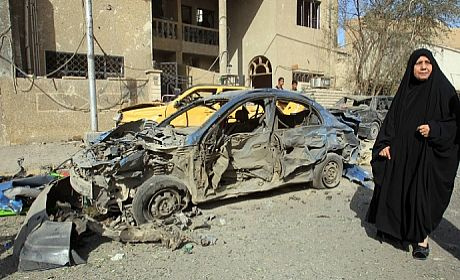The Problem Is the Political Leadership

The explosion of 8 vehicles in Baghdad shows that the security situation in this city is worsening day by day and during the last month more than 700 people have lost their lives due to these bombings. What are the reasons, in your opinion, behind this insecurity?
The recent bombings and violence in Iraq is not a new issue and has been going on since the downfall of Saddam. But sometimes the volume of this violence is reduced and at other times the number of these bombings increases.
Yes, the issue is the growing number of these bombings. Based on the recent UN report, this violence has killed more than 2600 people during the three months of April, May, and June alone. Last year was one of the bloodiest years since the attack against Iraq in 2003. What are the reasons behind the growing violence?
There are numerous reasons for the recent insecurities in Iraq. One of them is related to the political problems of this country. You see, political competitions in Iraq are not yet correctly solved and different groups have not learnt that they should not sacrifice national interests for their personal and party interests. The existing differences and rifts between the Iraqi groups and officials have led to problems in maintaining security. Therefore, in my opinion, lack of unity between the security forces in Iraq is one of the important issues in this regard. Unfortunately, the political factions and competitions have impacted the security forces and partisanship has had negative effects on the situation of Iraq’s intelligence organizations. Furthermore, the crisis in Syria has also impacted the security in this country. Therefore, the recent bombings are nothing new and it is only the volume that has increased.
You mentioned the issue of Syria and that it is one of the roots of the violence in Iraq. How has this crisis impacted the situation in Iraq?
The political, military, and security conditions of the region are intertwined and when there is insecurity in any of Iraq’s neighboring countries, it will certainly affect the security conditions in Iraq as well. Nevertheless, as the crisis in Syria intensifies, it can be expected that the insecurity and violence would increase in the entire region. What is obvious is that following the crisis and the civil war in Syria, radical groups, the al-Qaeda, have found a good opportunity to be present in the scene. By founding a group called the Islamic State of Iraq and attempting to link it to Syria, al-Qaeda intends to rule over this region. They have close relations with the al-Nusra front in Iraq and act based on the same goals and motivations in both Iraq and Syria.
What measures has the government of Iraq taken to prevent the spread of this insecurity?
The government of Iraq has attempted to separate itself from the crisis in Syria and prevent the spread of this crisis into Iraq. Nevertheless, it has not been very successful in this regard. The reason is that Iraq itself is faced with serious problems inside the country and the domestic differences have prepared the ground for the entrance of foreign and radical forces. In my opinion, one of the necessary and important measures which should be taken is to create unity and set aside personal and partisan interests. If this happens and the political forces unite over national principles and interests, then the security forces will also be united. The security forces in Iraq must see each other as colleagues and not rivals. When these political and security rifts exist in Iraq, the al-Qaeda forces will also use the security vacuum created by these differences and attempt to intensify insecurity.
How serious would you consider the Shiite-Sunni dispute to be in Iraq?
I believe that this is not very serious. Different sects and ethnic groups have lived alongside each other for centuries. What is now happening in Iraq cannot be defined within the framework of the Shiite-Sunni dispute; it is rather the opportunism of special groups which attempt to use this atmosphere and the Shiite-Sunni differences for their own benefit. The problems that exist in Iraq today are reflected as differences between the Shiites and Sunnis while the problem, in my opinion, is related to the political leadership in Iraq which attempt to rule with their own ideas and also their party’s ideas whereas they ought to seek unity and set aside their personal interests.
Therefore, is the problem rooted in Iraq’s political officials?
Yes. These issues and the recent events in Iraq show that the political and security officials have not been able to solve the problems and establish security. As I mentioned before, there are no problems among the people. These problems and differences exist between the officials. When security forces become involved in these differences, such problems will be created.
What measures should the Iraqi officials take to reduce the violence?
The most important measure is to create unity. Discord is the most important problem in Iraq today. A look at the political scene in Iraq shows that everyone pursues his own interests. On this basis, we cannot hope to solve the basic problems of the country, especially in the area of security issues.
How much of an influence, in your opinion, do foreign countries have in these insecurities?
It seems that we cannot ignore the impacts of foreign countries on the political and security situation in Iraq. This does not mean that these countries act directly in Iraq; they rather intervene generally through groups which are active inside this country. Different countries support different groups in Iraq and these supports will lead to more conflicts between groups and to separation in the political scene of the country. Hence, this issue is also one of the elements of insecurity in Iraq.

